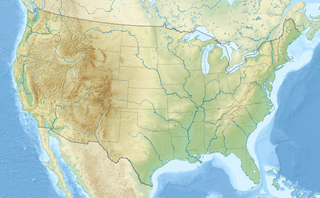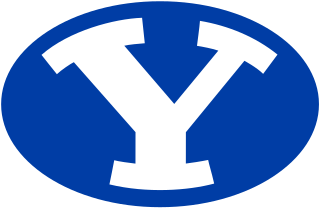
Amos Alonzo Stagg was an American athlete and college coach in multiple sports, primarily American football. He served as the head football coach at the International YMCA Training School (1890–1891), the University of Chicago (1892–1932), and the College of the Pacific (1933–1946), compiling a career college football record of 314–199–35 (.605). His undefeated Chicago Maroons teams of 1905 and 1913 have been recognized as national champions. He was also the head basketball coach for one season at Chicago (1920–1921), and the Maroons' head baseball coach for nineteen seasons.

Bill Snyder Family Stadium is a stadium in Manhattan, Kansas. It is used for American football, and is the home field of the Kansas State University Wildcats football team. It is named after the family of head coach Bill Snyder. Over the past 29 seasons – from 1990 through the 2019 season – K-State is 158–43–1 (.785) at home.

LaVell Edwards Stadium is an outdoor athletic stadium in Provo, Utah, on the campus of Brigham Young University (BYU). Primarily used for college football, it is the home field of the BYU Cougars, an independent in the Football Bowl Subdivision. Opened as "Cougar Stadium" in 1964, its seating capacity is 63,470.

Reuben LaVell Edwards was an American football head coach for Brigham Young University (BYU). With 257 career victories, he ranks as one of the most successful college football coaches of all time. Among his many notable accomplishments, Edwards guided BYU to a national championship in 1984 and coached Heisman Trophy winner Ty Detmer in 1990.

Amos Alonzo Stagg Memorial Stadium, previously known as Pacific Memorial Stadium, was a 28,000-seat outdoor multi-purpose stadium in the western United States, located on the campus of the University of the Pacific in Stockton, California. The home venue of the Pacific Tigers was constructed in 1950 for football and later hosted women's soccer; it was closed in 2012 and demolished two years later.
Stagg Fieldis an athletic field on the campus of Springfield College in Springfield, Massachusetts. With bleacher seating for 3,867, is it the home field for Springfield College's football, field hockey, and men's and women's lacrosse team. It is also used for physical education classes and intramural sports. The Springfield College men's and women's soccer teams formerly played on the field.

The BYU Cougars football team is the college football program representing Brigham Young University (BYU), a private university owned by The Church of Jesus Christ of Latter-day Saints. The Cougars began collegiate football competition in 1922, and have won 23 conference championships and one national championship in 1984.
The 1984 BYU Cougars football team represented Brigham Young University (BYU) in the 1984 NCAA Division I-A football season. The Cougars were led by 13th-year head coach LaVell Edwards and played their home games at Cougar Stadium in Provo, Utah. The team competed as a member of the Western Athletic Conference, winning the conference for the ninth consecutive year. The Cougars finished the regular season as the only undefeated team in Division I-A, and secured their first ever national title by defeating Michigan in the 1984 Holiday Bowl.
The 1972 BYU Cougars football team represented Brigham Young University (BYU) for the 1972 NCAA University Division football season. It was their first year under head coach LaVell Edwards and the Cougars finished over .500 for the first time since 1969.
The 1992 BYU Cougars football team represented Brigham Young University (BYU) for the 1992 NCAA Division I-A football season. The team was led by head coach LaVell Edwards and played their home games at Cougar Stadium in Provo, Utah. The cougars participated as members of the Western Athletic Conference.
The 1977 BYU Cougars football team represented Brigham Young University (BYU) for the 1977 NCAA Division I football season. The Cougars were led by sixth-year head coach LaVell Edwards and played their home games at Cougar Stadium in Provo, Utah. The team competed as a member of the Western Athletic Conference, winning a share of the conference title for the second consecutive year, sharing the title with Arizona State with a conference record of 6–1.
The 1979 BYU Cougars football team represented Brigham Young University (BYU) for the 1979 NCAA Division I-A football season. The Cougars were led by eighth-year head coach LaVell Edwards and played their home games at Cougar Stadium in Provo, Utah. The team competed as a member of the Western Athletic Conference, winning the conference title for the fourth consecutive year with a conference record of 7–0. BYU finished the regular season with an undefeated record of 11–0. BYU was invited to the 1979 Holiday Bowl, where they lost to Indiana. They were ranked 13th in the final AP Poll and 12th in the final Coaches Poll.
The 1978 BYU Cougars football team represented the Brigham Young University (BYU) in the 1978 NCAA Division I-A football season as a member of the Western Athletic Conference (WAC). The team was led by head coach LaVell Edwards, in his seventh year, and played their home games at Cougar Stadium in Provo, Utah. They finished the season with a record of nine wins and four losses, as WAC Champions and with a loss against Navy in the Holiday Bowl.
The 1973 BYU Cougars football team represented Brigham Young University during the 1973 NCAA Division I football season. The Cougars were led by second-year head coach LaVell Edwards and played their home games at Cougar Stadium in Provo, Utah. The team competed as a member of the Western Athletic Conference, finishing tied for fourth with a conference record of 3–4.
The 1975 BYU Cougars football team represented Brigham Young University during the 1975 NCAA Division I football season. The Cougars were led by fourth-year head coach LaVell Edwards and played their home games at Cougar Stadium in Provo, Utah. The team competed as a member of the Western Athletic Conference, finishing tied for fourth with a conference record of 4–3.
The 1976 BYU Cougars football team represented Brigham Young University during the 1976 NCAA Division I football season. The Cougars were led by fifth-year head coach LaVell Edwards and played their home games at Cougar Stadium in Provo, Utah. The team competed as a member of the Western Athletic Conference, winning a share of the conference title with Wyoming with a conference record of 6–1. BYU was invited to the 1976 Tangerine Bowl, where they lost to Oklahoma State.
The 1982 BYU Cougars football team represented the Brigham Young University (BYU) in the 1982 NCAA Division I-A football season as a member of the Western Athletic Conference (WAC). The team was led by head coach LaVell Edwards, in his eleventh year, and played their home games at Cougar Stadium in Provo, Utah. They finished the season with a record of eight wins and four losses, as WAC Champions and with a loss against Ohio State in the Holiday Bowl.
The 1985 BYU Cougars football team represented Brigham Young University during the 1985 NCAA Division I-A football season. The Cougars were led by 14th-year head coach LaVell Edwards and played their home games at Cougar Stadium in Provo, Utah. The team competed as a member of the Western Athletic Conference, winning a share of their 10th consecutive conference title with a conference record of 7–1, sharing the title with Air Force. BYU was invited to the 1985 Florida Citrus Bowl, where they lost to Ohio State. The Cougars were ranked 16th in the final AP Poll with an overall record of 11–3.
The 1994 BYU Cougars football team represented Brigham Young University (BYU) in the 1994 NCAA Division I-A football season. The Cougars were led by 23rd-year head coach LaVell Edwards and played their home games at Cougar Stadium in Provo, Utah. BYU finished with a record of 10–3 to finish tied for second in the Western Athletic Conference. This was the first season since 1988 that the Cougars failed to win at least a share of the WAC conference title. BYU was invited to the 1994 Copper Bowl, where they defeated Oklahoma. They were ranked 10th in the final Coaches Poll and 18th in the final AP Poll.
The 1988 BYU Cougars football team represented Brigham Young University during the 1988 NCAA Division I-A football season. The Cougars were led by 17th-year head coach LaVell Edwards and played their home games at Cougar Stadium in Provo, Utah. The team competed as members of the Western Athletic Conference, finishing tied for third with a record of 9–4. BYU was invited to the 1988 Freedom Bowl, where they defeated Colorado.






